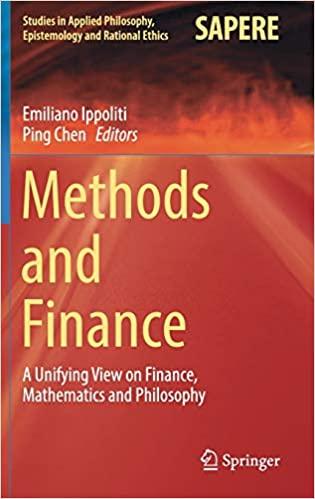Question
Question 1 Homework questions for Week 5 Time Value of Money You purchase a bond for $15,000 which you plan to hold until it matures
| Question 1 |
|
| |||||
|
| You purchase a bond for $15,000 which you plan to hold until it matures in 10 years. It pays 4% SIMPLE interest per year. How much interest will you earn on your investment if you hold it as planned?
| ||||||
| Question 2 | |||||
|
| To improve your earnings from the investment in #1 you invest each year's interest (which is paid at the end of the year) in a money market fund that pays 2% compound interest per year. You do this only until the bond matures in the beginning of year 10. What will you earn if you do this?
| ||||
| Question 3 | |||||
|
| Your firm must replace its delivery truck, so you purchase one for $42,500. You finance it for 5 years at 3% per year and make equal MONTHLY PAYMENTS each month for the 5 years (60 months). Assuming you finance the entire amount how much will you have PAID for the truck?
| ||||
| Question 4 | |||||
|
| When shopping to replace the delivery truck in the last question you found a competing dealer who offered this choice: Option 1. Get $3000 'cash back', then pay the balance in 5 annual payments at 2.0%; Option 2. pay 'full price' in 5 annual installments at no (0%) interest. Which is the better deal, that is, under which deal will you PAY LESS? How much more or less does the better option cost compared to your answer in number 3 once all payments are made?
| ||||
| Question 5 | |||||
|
| Your firm purchases a piece of property by buying it outright for $515,000. Historically, nearby property in the neighborhood has appreciated in value about 4% per year. Assuming you can rely on this historic appreciation what will the property be worth AT THE END OF 20 YEARS?
| ||||
| Question 6 | |||||
|
| In doing some retirement planning you determined that you want to save $25,000 each year until you retire. You plan to invest it in a 'guaranteed return mutual fund' which pays COMPOUND interest at 4% per year; you plan to keep it invested there until you retire in 30 years. WHAT WILL THE INVESTMENT BE WORTH THEN?
| ||||
| Question 7 | ||||||||||||
|
| Your firm must replace its packaging machine after its useful life of 10 years passes and depreciation can no longer be claimed on it. The estimated replacement cost is $5,550,123. How much must the company save (invest) each year at 2% to accumulate enough to replace the machine? | |||||||||||
| | ||||||||||||
| Question 8 | ||||||||||||||||
|
| You are offered two investments for the firms retained earnings ($4,238,000). As CFO you are looking for good ways to invest the firms hard earned money. Which option will give you a better return on and of investment (two ROIs)? Option 1 pays out at 4% simple interest for five years Option 2 pays out at 2% compound interest for four years | |||||||||||||||
| | ||||||||||||||||
| Question 9 |
| ||||
|
| Increasing the number of periods could impact all of the following except A PV of an annuity B PV of $1 C FV of $1 D FV of an annuity | ||||
Question 10
For a given interest rate, the future value of $100 increases with the passage of time. Thus the longer the period of time, the greater the future value.
True or False?
Question 11
Everything else being equal, the lower the discount rate, the higher the present value.
True or False?
Question 12
Everything else being equal, the longer the period of time, the lower the present value.
True or False?
Question 13
John just inherited $100,000 from his Aunt Emma. He wants to retire in 25 years. John has decided to put the entire amount in a savings account paying 6% interest. This is an example of:
a. present value of a lump sum
b. present value of an annuity
c. future value of a lump sum
d. future value of an annuity
Question 14
A term associated with future value is "compounding"; a term associated with present value is "discounting".
a. True
b. False
c. OK, if you can't make up your mind: none of the above
d. There is no "d" but this stupid program won't let me have only three answers. A note to students: this is NOT the correct answer - don't even try it! J
Question 15
As the interest rate increases for any given period, the future value interest factor will
a. decrease
b. increase
c. remain unchanged
d. approach 1.0
Question 16
For a given interest rate, as the length of time until receipt of funds increases, the present value interest factor
a. changes proportionally
b. increases
c. decreases
d. remains unchanged
Step by Step Solution
There are 3 Steps involved in it
Step: 1

Get Instant Access to Expert-Tailored Solutions
See step-by-step solutions with expert insights and AI powered tools for academic success
Step: 2

Step: 3

Ace Your Homework with AI
Get the answers you need in no time with our AI-driven, step-by-step assistance
Get Started


